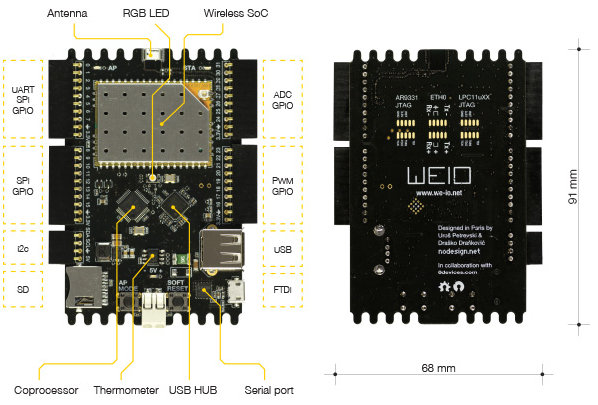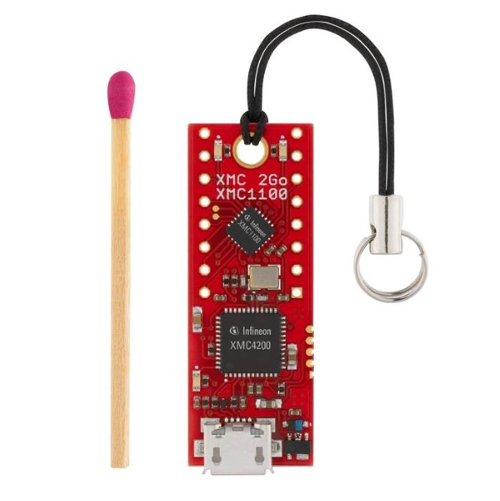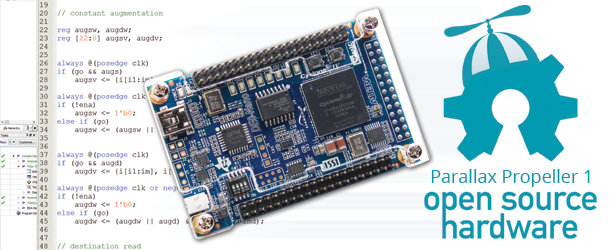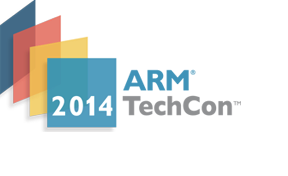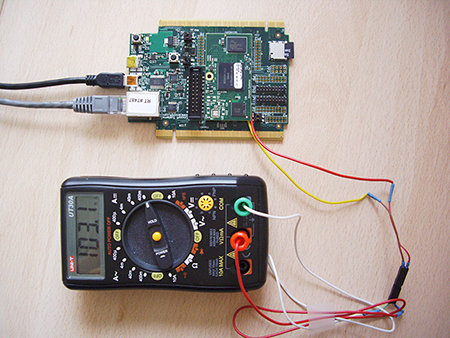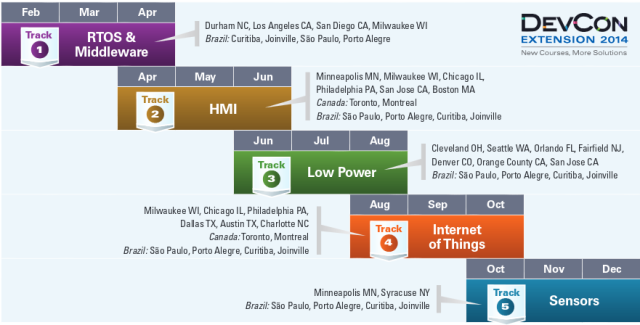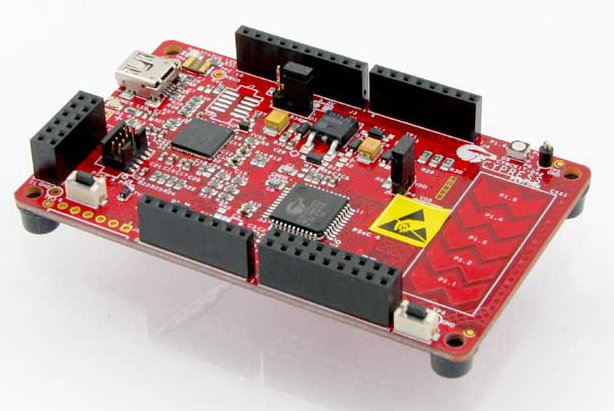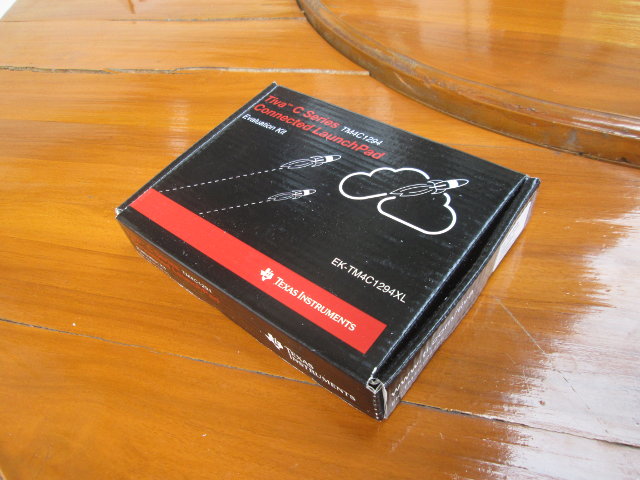WeIO is an open source hardware board for the Internet of things with Wi-Fi connectivity and lots of I/Os designed by nodesign, a French based startup, in collaboration of 8devices, the makers of the Carambola boards. WeIO is powered by an Atheros AR9331 SoC running OpenWRT as well as an NXP LPC MCU for faster handling of I/Os and support for analog I/Os. One interesting aspect of this board is that it can be programmed via a web browser using HTML5 or Python, and it does not rely on the Cloud to store data. WeIO hardware specifications: SoC – Atheros AR9331 MIPS 24K Wireless SoC @ 400 MHz MCU – NXP LPC11xx ARM Cortex M0 MCU for analog I/O and real-time H/W interfaces System Memory – 64 MB DDR2 Storage – 16 MB flash + micro SD slot Connectivity – 802.11 b/g/n Wi-Fi with on-board antenna (AP and STA modes), […]
Infineon XMC 2Go Cortex M0 Development Kit Sells for 5 Euros
Infineon brought another tiny, portable, and cheap ARM Cortex M0 board to market with XMC 2Go development kit featuring XMC1100 ARM Cortex M0 micro-controller with 16KB RAM, 64KB Flash, and tow breadboard friendly headers to access various serial interfaces and ADC pins. Key features listed on Infineon website: MCU – Infineon XMC1100 ARM Cortex-M0 MCU @ 32 MHz with 64KB flash, 16KB RAM. Debugger – On-board J-Link Lite Debugger using an XMC4200 Microcontroller. Headers – 2×8 pin headers suitable for Breadbord with access to 2x USIC (Universal Serial Interface Channel: UART, SPI, I2C, I2S, LIN), 6x 12-bit ADC, external interrupts (via ERU), 4x 16-bit timers Misc – 2 x user LED, RTC Power – 5V Micro via USB, or 3.3V external power. ESD and reverse current protection Dimensions – 14.0 x 38.5 mm The board is programmed via USB using the same Dave IDE I tried with XMC4500 Relax […]
Parallax Propeller 1 P8X32A Open Source Multi-core MCU
Lots of electronics devices are now powered by open source software such as Linux, open source hardware is not as wide-spread, but gaining tracking traction thanks to the like of Arduino, Beagleboard.org, Olimex, and many projects on crowdfunding websites, and now we even start seeing some open source silicon. Existing open source processors include LEON3 (SparkV8) MCU, OpenRisc, and just very recently, LowRISC, based on 64-bit RISC-V instruction set architecture, has been announced with the backing of some of Raspberry Pi co-founders, Google ATAP, etc… and is currently being developed at the University of Cambridge, UK. Parallax Propeller 1 P8X32A is another MCU which has been open sourced last week. Propeller 1 P8X32A had however been released in April 2006, and can be sourced as a 40-pin DIP chip for prototyping, and 44-pin QFP and QFN for production, and come with the following key features: Power Requirements: 3.3 VDC […]
ARM TechCon 2014 Schedule – 64-Bit, IoT, Optimization & Debugging, Security and More
ARM Technology Conference (TechCon) 2014 will take place on October 1 – 3, 2014, in Santa Clara, and as every year, there will be a conference with various sessions for suitable engineers and managers, as well as an exposition where companies showcase their latest ARM based products and solutions. The detailed schedule for the conference has just been made available. Last year, there were 90 sessions organized into 15 tracks, but this year, despite received 300 applications, the organizers decided to scale it down a bit, and there will be 75 session in the following 11 tracks: Chip Implementation Debugging Graphics Heterogeneous Compute New Frontiers Power Efficiency Safety and Security Software Development and Optimization Software Optimization for Infrastructure and Cloud System Design Verification There are also some paid workshops that take all day with topics such as “Android (NDK) and ARM overview”, “ARM and the Internet of Things”, or “ARM […]
Low Power Mode (Suspend to RAM) in uCLinux for Freescale Kinetis K70 MCU
All ARM based micro-controllers and processors implement multiple power mode in order to save optimize power usage depending on the tasks. However, I’ve been told by some hobbyists/developers/makers that low power modes are not always implemented in Linux, especially for low cost systems either because of hardware limitations or the software is not implemented. EmCraft Systems has just released their latest embedded (uC-) Linux distributions for the MCU boards, and one of the features now available is “suspend to RAM” for their K70 SoM development kit, based on Freescale Kinetis K70 Cortex M4 MCU, which consume just around 600 to 700 uA @ 3.3V (2 to 2.3 mW) in this low power mode. They have connected a multimeter to measure the current drawn at different power modes. If you want to know all the details, you should probably read the company’s article on “Linux Low-Power Mode on Kinetis“, but I’ll […]
Renesas DevCon Extension Organizes Free One-Day Courses About IoT, Low Power, Sensors and More
I’ve just come across a YouTube video called Ultra-Low-Power Solutions for Wearable Technology and the ‘Internet of Things’ On Renesas channel. The video itself promotes Cymbet EnerChip Solid State Batteries and Kits, working together with Renesas MCUs, and the interesting part is that they’ll provide a free training session for the kit as part of Renesas Devcon Extension 2014. This is not a single event as you may think, but instead the company hosts one-day workshops in various cities in the US and Brazil covering various tracks all year long, as you can see in the simplified schedule below. RTOS & Middleware track is not available anymore, but you can still attend training sessions for Human Machine Interfaces, Low Power designs, the Internet of Things and Sensors. As an example, the following lectures are available for the Low Power track: Renesas Low-Power MCU Lineup (30 minutes) – Updated technology roadmap […]
Get Cypress PSoC 4 MCUs for $1 Delivered to Your Door by Fedex
How many times have you found a low cost MCU, or a development kit, ready to order, until shipping fees, sometimes several times the price of the item, curbed your enthusiasm, to the point you just decided to cancel your purchase? It happened to me several times, so I was pleased to find out Cypress Semiconductor will ship their PSoC 4 MCUs via Fedex anywhere in the world without actually charging for shipping. PSoC 4 are ARM Cortex M0 MCUs with up to 32 kB Flash, up to 4 kB SRAM, and analog and digital I/Os. CY8CKIT-042 PSoC 4 Pionner Kit is the corresponding kit development kit, which happened to be voted product of the year 2013 on Element14 community beating the BeagleBone Black, Freescale SABRELite, and PiFace Digital for the Raspberry Pi. Development can be performed using PSoC Creator, and there seems to be a developer community active enough to provide 100 projects in 100 days. So […]
Texas Instruments Tiva C Series Connected LaunchPad Unboxing and Quick Start Guide
Texas Instruments Tiva C Series TM4C1294 Connected LaunchPad is an evaluation kit for the Internet of things with a Cortex-M4 MCU (Tiva TM4C1294), an Ethernet port, and USB interfaces for power and debugging. At $19.99 including shipping via Fedex, it’s one of the cheapest ways to get devices online. I’ve purchased one via TI e-Store, and already received it. I’ll post some pictures of the kit, go through the Quick Start Guide, and provides links to resources to go further. EK-TM4C1294XL Connected LaunchPad Unboxing I’ve received the kit in the package below with feature a QR Code linking to http://www.ti.com/launchpad, as well basic specifications (refer to my previous post for specs), list of tools (Code composer studio, Tivaware, Keil, IAR…) and package content. In the box we’ve got the board itself, a retractable Ethernet cable, a USB to micro USB cable for power and debugging, and Connect LaunchPad Quick Start […]


